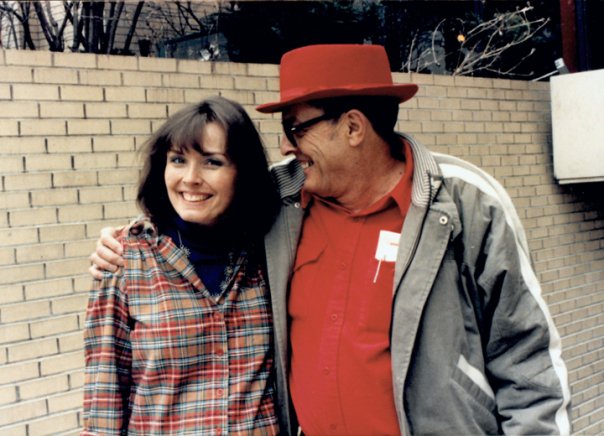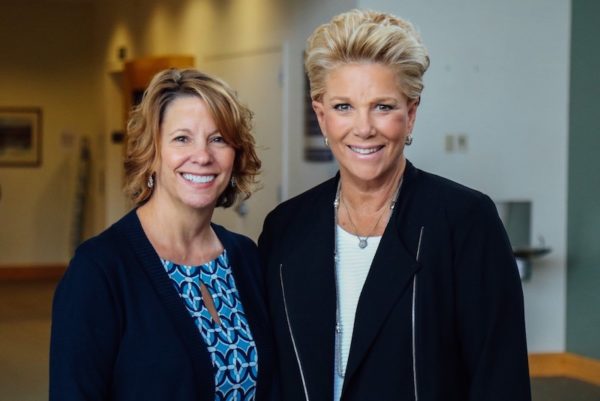This is one of my favorite pictures of my dad and me. We were both so young! It’s safe to say that I’m older now than he was in that picture. I know they’re clichés but time does fly — in the blink of an eye.
My dad passed away in 2009. He had a lot of health problems in the last few years of his life and being the “medical person” in the family, I often accompanied him to doctor’s appointments.
I remember how freaked out I was when his primary care doctor asked him what he wanted at the end of his life. He responded immediately that he wanted no extraordinary measures — he’d had a great life and when his time came to just let him go.
As startled as I was, I was also grateful to be part of that conversation. It not only forced me to face reality, it also opened the door to further discussions with my parents.
An advance directive
Following the doctor’s suggestion, my parents made out their advance directives, which included a living will and medical power of attorney.
- Living will — a legal document that spells out what medical treatments and life-sustaining measures you would or wouldn’t want if you were terminally ill or seriously injured and could no longer communicate.
- Medical power of attorney — a legal document that designates who you want to make your medical decisions if you can’t.
Daryl Cady wasn’t that fortunate. When her mother became critically ill a few months ago, she did not have an advance directive spelling out how she wished to be treated. In the end, family members had to grapple with some fairly difficult decisions — like whether a feeding tube should be inserted. It was, but only briefly.
Her mother died comfortably with hospice care five days after she was admitted to the hospital. While it might seem like a short time, for Daryl it was a lifetime. If only she’d known her mother’s wishes, she might have been able to focus on what was most important during those days. “To only be her daughter, not a decision maker,” she said.
Statistics show that 82 percent of people in the United States believe an advance directive is important, yet only 23 percent have actually filled one out. Why so few? “I think it forces us to face our mortality,” said Daryl “and people don’t want to talk about the inevitable and the end. It’s just too scary and too frightening.”
Prepare to Care: Completing an Advance Directive
Daryl happens to be in a position to encourage and motivate people to fill out their advance directives and to share their wishes with family members. She’s the Chief Executive Officer of Hospice of Southern Maine. Every year the organization sponsors the Thresholds Conference. The focus of this year’s conference, which took place May 11 (2017) was Prepare to Care: Completing an Advance Directive.
The keynote speaker was Joan Lunden. You may have heard of her. She was the host of Good Morning America for nearly two decades. In addition to being an award-winning journalist, she’s also a health and wellness advocate and an experienced caregiver (not only because she’s the mother of seven children, but also because she cared for her mother.) She’s written 10 books, including one that documents her diagnosis and treatment of breast cancer three years ago and another that details her experience of caring for her aging mother.
I’m giving you this extensive background because I want you to have a good sense of how accomplished this woman is. And yet, like Daryl, also an accomplished woman, she was not fully prepared when she suddenly had to take care of her mother.
The back story is that Joan’s brother had been living with their mother in California and he died unexpectedly of diabetes complications at the age of 56. Joan and her family lived on the east coast. “Overnight, I became the instant caregiver,” Joan told the audience at the conference. “My mom was 88 and overcome with grief. She had lost her son. On top of the trauma, she had some dementia. I sifted through papers looking for important documents. It took me months to track down stuff. I had to reconstruct her life. At the same time, I had to plan the funeral. I thought I had it all under control. I was mistaken.”
Daryl and Joan learned the hard way why it’s important to make decisions about end-of-life care sooner rather than later. And put them in writing. Then you can decide what you want and who you want to be your personal agent(s) — someone who will understand and follow your wishes and be your advocate.
When to have the conversation
Having a conversation about your wishes with your spouse, your children or other loved ones is usually much easier when you’re feeling well and in control than when it’s a crisis situation. “When you’re younger,” said Joan, “you can look at it with a different frame of mind. Which is why I highly recommend that people don’t wait — especially for the advance health care directive because those are difficult concepts. Feeding tubes and respirators and organ donations. The more fragile and the older you are I think the more difficult it becomes to have the conversation.”
So, start the conversation now. You’ll be doing your family and yourself a huge favor. And remember, it’s not only about filling out the advance directive form and stipulating whether or not you want life support or a feeding tube, it’s also about your funeral, where your important papers are, and what matters to you.
Joan says she and her husband learned that lesson well and now, her children are informed. “It took a lot of trips back to the inkwell to get it all together but we now all have packets,” she told me. “My husband and I have packets that have instructions for if something happens to us.”
To help you figure things out and start your conversation, Hospice of Southern Maine is holding a series of community forums. You’ll get to see a brief video of highlights from the conference, hear from some local experts about care decisions in the Maine Health Care Advance Directive form, and get help completing your own form.
Post-Conference Community Forums
(Free/light meal included)
Falmouth – June 8 @ 9 am, Falmouth Congregational Church
Bridgton – July 13 @ 5:30 pm, Bridgton Hospital (Old Building)
Cape Elizabeth – July 11 @ 5:30 pm, Cape Elizabeth Community Center
Freeport – September 14 @ 5:30 pm, Freeport Library
Biddeford – October 19 @ 5:30 pm, Sam L. Cohen Center
Kennebunk – October 24 @ 9 am, Kennebunk Senior Center
Sanford – November 16 @ 5:30 pm, Nasson Community Center
Click here for more information and to register for Thresholds Community Forums. Advance directive forms are fairly easy to fill out, but they vary from state to state. If you’re not in Maine or can’t attend a forum, you’ll find links to forms for every state on Caring Connections, as well as more useful information about planning ahead.
And thank you to Hospice of Southern Maine for sponsoring the conference and the forums and to Daryl and Joan for getting so personal with us. “I think that whenever we share our stories we help others and we empower them,” said Joan when I asked her why she travels around the country telling her story. “I made a lot of mistakes along the way. I should have had a better plan. I didn’t have all the papers in place that I should have. I didn’t know where all the important papers were so I made a lot of mistakes along the way and it just occurred to me that it shouldn’t have to be this hard. If you prepare. I had this opportunity to be able to learn from my mistakes and then share with others and help others be better prepared for this inevitable chapter of our life.”
Are you prepared?



Leave A Comment